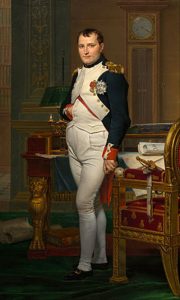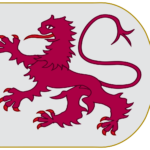Napoleon Bonaparte gave his name to the civil code of 1804. Subsequent battles – Trafalgar, Waterloo etc. did not affect the Emperor’s Code, which has influenced existing legal codes in Belgium, Spain, Holland, Switzerland and Italy, as well as several states outside Europe.
Before the Revolution (q.v.) there were law systems differing from each other in France – according to geography, Roman law in the south, customary or traditional law in the north. Some effort had been made to codify and make more effective and logical the law during the ancien régime (q.v.) and even during the Revolution. The idea was to create a uniform system which could apply to all France. No efforts were successful, mostly because during the Great Terror all law was thrown to the winds. It needed the powerful personality of Napoleon himself to provide the driving force; he was personally present, and presiding, during more than fifty of more than a hundred sessions of the Council of State, called precisely to discuss the Penal Code.
By the time debate had stopped there was (a) equality before the law and (b) religious toleration and (c) the abolition of privilege and (d) a new system of extracting dues from the aristocracy (if and when the emigrés from the Terror had returned from exile).
Revolutionaries had insisted on a new land settlement: the sale of Church lands etc. and the debates confirmed this revolutionary right. Property was to be inherited equally by male heirs except for a certain proportion, usually between a quarter to a half of all, which was to be reserved for one single heir. Women, as usual, got no look-in at all. Trade unions and employers’ associations were to be banned (one in the eye for the revolutionaries), and strikes were made illegal (another blow for the sans-culottes).
Liberal maxims and idealism made manifest during the Revolution were abolished (or at least neglected) which referred to both women and children; indeed, a husband’s authority over both was emphasized, as was the actual inferior position of women as a whole. Madame Defarge would have to grit her teeth. The Code said, ‘A husband owes protection to his wife, and a wife owes obedience to her husband: married women are incapable of making contracts’ etc. etc.
The subject of divorce occupied many of the sessions that eventually produced the Code. It remained on the books, but while a wife could be divorced for adultery with another man, a husband could be divorced only if he brought his mistress to live in the family home – an exceedingly rare occurence – even in France.
The Code, which was revised sparingly in 1904 (a century after the original), exists as the basis for French civil law, after being imposed during the existence of Napoleon’s Empire. Divorce laws have been ‘liberalized’, but inheritance laws are virtually untouched. In Spain, the people’s laws of inheritance are fair and logical, whereas in the United Kingdom they are not. There, a person can leave an entire fortune to a cats’ home if they so wish. This is impossible in any of the many countries which still employ the Code Napoléon.









Leave A Comment